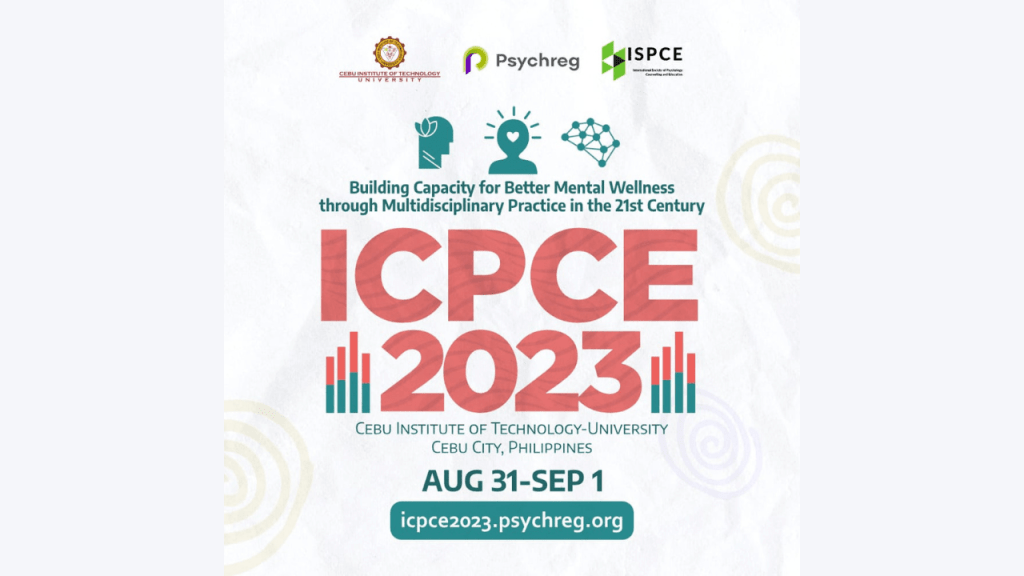The 5th International Conference on Psychology, Counselling and Education (ICPCE 2023) is an interdisciplinary conference that brings together scholars and practitioners from a range of backgrounds to consider research, policy, rhetoric, and practice on how we can advance our understanding of psychology, counselling, and education.
As we approach ICPCE 2023, we wanted to share some important reminders and information to ensure a smooth and enriching experience for all participants, both in-person and online.
General guidance
Conference website and programme
- Visit our official conference website for the most up-to-date information.
- The conference programme and timetable for the parallel sessions are currently being updated. Please check back soon for finalised details.
For online participants: Time zone and schedule
- All times mentioned are in Philippine time. If you need to convert to your local time zone, consider using tools like 24timezones.
For online participants: Zoom access and guidelines
- Main event: A single Zoom link will be provided for the entire two-day event. This link will be available on the updated conference programme.
- Parallel sessions: Separate Zoom links will be provided for each parallel session. These links can be found on the timetable for the parallel sessions once updated.
- Online etiquette: When signing into Zoom, please use your full name. Note that unregistered participants (those not on our list) will be removed from the Zoom rooms. We maintain a strict list of registered participants to ensure the integrity of the conference.
- Technical support: Online participants experiencing technical issues can reach out to our support team: dennis@psychreg.org
Registration and fees
- Please be reminded that registration fees are non-refundable.
Feedback and certificate
- After the conference, a feedback form will be sent to all participants. Your feedback is invaluable to us. Upon completion of this form, you will receive a certificate of participation.
Engage with us online
- Join the conversation using the hashtag #ICPCE2023.
- Stay updated and engage with our community by following us on @wearepsychreg
For in-person paper presenters
The conference will be held at Cebu Institute of Technology-University. Please ensure you arrive at least 1 hour before the start time to facilitate registration and seating.
For online paper presenters
- All the Zoom links are available from the timetable for the parallel sessions.
- Please join your respective Zoom room 10 minutes before your scheduled time. The session chair will make you a “co-host” so you can share your screen.
- Please stick with the 15-minute time frame (10 minutes for presentation; 5 minutes for Q&A).
Conference proceedings
- All abstracts will be included in the conference proceedings to be published in the March 2024 issue of Psychreg Journal of Psychology. To give you an idea, here are the conference proceedings of ICPCE 2019, held in Malaysia.
- Only registered paper presenters will be included in the conference proceedings. Co-authors who have not registered will not be included in the conference proceedings.
Tips for oral presenters
How to manage your time
- You will only have 15 minutes to deliver your paper’s most important information (10 minutes for presentation; 5 minutes for Q&A). Therefore, it is important that you efficiently manage your presentation within the allotted time (Do not ramble, do not make unnecessary comments, do not share the story of your life).
- There will be chairs for each session. After your presentation is introduced, have at least a minute to have the audience ready to listen. This can be done by showing your title slide and telling what your research is all about.
- The chair will give you a cue if your time is nearly up.
- We advise you to use no more than one slide per minute of your allotted time.
- It is better to decrease the amount of information presented on one slide rather than to confuse the audience with slides that contain too much information and cannot be read quickly.
How to structure your presentation
- Stick with the general outline of a written research paper for your paper presentation (research problem, related studies, method, results, conclusion, and implications). Listeners expect and are familiar with this universal and logical format.
- Choose a font that is easy to read. Popular fonts include Arial, Times New Roman, or Century Gothic, but any professional-looking font is fine, as long as you use it consistently.
- Keep your PowerPoint simple and professional. We know it’s tempting to impress us with your amazing animations skills, but we’re not after that. We just want to know what your research is all about.
- Limit your bullets (preferably five lines), excluding the slide’s title and subtitle.
- Each slide should have no more than 1–3 points to make. And the entire presentation should have no more than a total of three major points, all of which should be repeated in your Conclusions slide.
- Pictures, diagrams, and videos are very helpful and important in presentations. Tables usually contain too much information and may confuse the audience unless a key row or column can be highlighted, or significant results can be seen easily.
Is it your first time to have a paper presentation?
How to explain the contents of your presentation
- Bulleted items on slides should contain keywords. These serve as reminders for what you intend to discuss at that point in your presentation or to emphasise a particular idea.
- Avoid using complete sentences after bullets. They can slow down your presentation and divert attention from the main points.
Pictures, diagrams, and videos can effectively convey complex ideas or provide evidence to support a claim. To maximise their impact, ensure they are immediately comprehensible to your audience. - When presenting a picture, diagram, or video, orient your audience by pointing out key features. This might involve using a descriptive title or highlighting specific areas of focus. Such guidance ensures everyone understands the content simultaneously, even if they’re unfamiliar with the subject.
- If references are crucial, incorporate them directly within the presentation rather than relegating them to a separate slide at the end. Listing references at the conclusion often renders them too small to read. Consider using a QR code for accessibility.
- Conclude your presentation by displaying your email address on the final slide. This allows attendees to reach out with any questions or feedback regarding your research.
How to answer questions about your research
- There are people who will ask questions not because they want to learn or because they have suggestions to improve your research, but simply because they want to show off their ability to criticise. It’s unfortunate, but it can happen.
- Address each question as best you can. If you’re unsure of an answer, it’s fine to admit it. To our knowledge, no one has ever been “assassinated” for not knowing an answer during a paper presentation. 🙂
- Relax and approach your presentation as an opportunity to share your research with others. While your research might have some shortcomings, it’s a testament to your dedication and hard work. Be proud of it. Remember, anyone can be an audience member, but it takes courage to stand up and present your findings.
A few more tips
- Don’t overcomplicate your presentation, it won’t make you sound intelligent; it just makes you sound pretentious. Here’s a particle physicist who managed to explain his science in a less complicated way – a particle physicist!
- Don’t try to wow us with highfalutin words. Intelligent people know how to get their message across in an accessible way. If you are confident with your research, you don’t have to sugarcoat it.
- Paper presentation is all about sharing your research; you are not in a competition with anyone to make your research sound so esoteric and philosophical – so just be natural and have fun.
We look forward to seeing you at the ICPCE 2023!




























